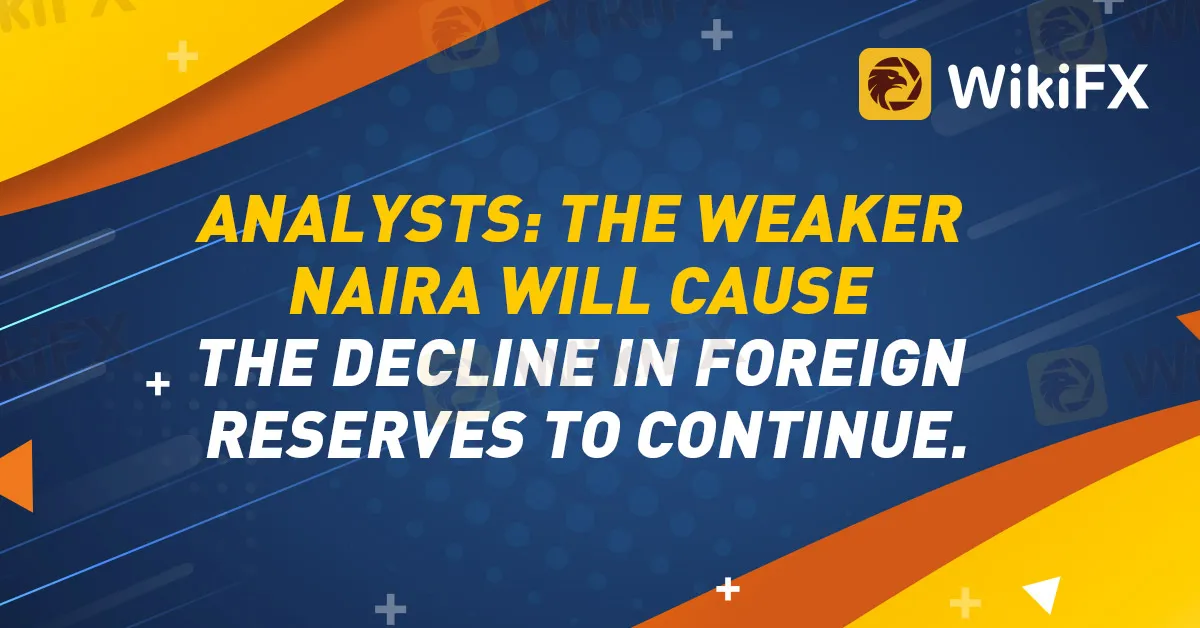简体中文
繁體中文
English
Pусский
日本語
ภาษาไทย
Tiếng Việt
Bahasa Indonesia
Español
हिन्दी
Filippiiniläinen
Français
Deutsch
Português
Türkçe
한국어
العربية
ANALYSTS: THE WEAKER NAIRA WILL CAUSE THE DECLINE IN FOREIGN RESERVES TO CONTINUE
Abstract:According to reports, it would take some time before Nigeria's foreign reserves start to recover from the recent fall.

According to reports, it would take some time before Nigeria's foreign reserves start to recover from the recent fall.
The Central Bank of Nigeria (CBN) released data on Monday showing that by March 23, 2023, Nigeria's FX reserves would have decreased by $93 million, or 2.53%, month over month.
According to the CBN, on February 23, 2023, FX reserves fell to $36.70 billion.
According to CBN data, the nation's FX reserves also decreased by 3.46 percent from the $37.06 billion they were on January 3, 2023, when the year began.
Due to Nigeria's failure to produce enough dollars to meet its needs, the largest economy in Africa has seen a fall in its dollar savings since last year.
Experts have ascribed the sustained decline of the naira value at all sectors of the dollar markets to the nation's ongoing loss of FX reserves.
The naira fluctuated between N750 and N770 last week on the black market, while it was quoted at N461.3 last week in the official Investors and Exporters' FX window (I&E), down from N461.8.
“This week, we expect to witness persistent pressure on the Naira across all market groups,” the experts at United Capital predict, given that FX headwinds will persist as dollar earnings remain low.
According to investment banking firm Cordros Capital, Nigeria's failure to expand its FX reserves and match the demand would endure over the short-to-medium term. There is no “good signal that suggests the pre-pandemic levels.”
The government's internal forex generation has continued to be undermined by low crude oil production and high premium motor spirit (PMS) under-recovery costs, while foreign portfolio investors (FPIs), who have historically supported supply levels in the official market, have stayed away because of the forex management policy.
The CBN said that it was confident that its many programs, the Naira-4-Dollar program, the RT-200 FX program, and other initiatives designed to promote remittances, would continue to improve the addition to external reserves and increase liquidity.
The rebate on both programs (the RT-200 FX program and the Naira-4-dollar program), in our opinion, is very unattractive to entice exporters and diasporans to the official window given between the official and illicit markets.
Foreign portfolio investment (FPI) and foreign direct investment (FDI) are currently at their lowest levels in more than five years, according to Afrinvest, thus the CBN should shift its attention to capital control regulations and the multiplicity of the currency window.
Despite the CBN's refusal to agree to the parallel market foreign currency rates, the majority of unmet US dollar demands from the official market are shifted to the parallel market. On the black market, the dollar to naira as reached 750 naira to the dollar. This represents an increase of 0.66 percent above the N755/$1 record set in session.
The International Air Transport Association estimates that foreign airlines are stuck with the CBN with $744 million (AITA).
Both producers and exporters have criticized the CBN for rationing.

Disclaimer:
The views in this article only represent the author's personal views, and do not constitute investment advice on this platform. This platform does not guarantee the accuracy, completeness and timeliness of the information in the article, and will not be liable for any loss caused by the use of or reliance on the information in the article.
Read more

Forex Success Stories: Lessons You Can Use to Win
There can be many ups and downs even for the world’s best forex traders. However, they remain undeterred in their vision to overcome the challenges that come their way. That’s why they form part of forex success stories that continue to inspire generations. One can inherit some lessons to be among successful currency traders. In this article, we will be sharing the lessons you can use to be successful in forex trading.

Forex Trading Signals - Your Gateway to Profitable Currency Trading
Want actionable forex trade recommendations or ideas for currency pair purchase or sale? Forex trading signals provide you with the same. Generated by professional traders, algorithms or trading systems, these signals help traders make informed decisions. Learn more about in this in-depth guide.

Top 5 Day Trading Forex Strategies That Can Help Elevate Your Wealth
Want to enjoy the thrill of forex day trading, where you open and close currency pair positions within the same day? Want to benefit from small market movements while avoiding overnight funding expenses? You need to understand day trading forex strategies. In this article, we will inform you about these and their implications.

Exploring the Benefits of Forex Investments
The Indian forex market is $60 billion strong, courtesy of the belief that it yields significant returns for investors over time. The visually impressive technical analytic tools give investors an insight into the market behavior. Assessing it through varying currency price movements helps them take an informed call on position and account sizes. Explore this article to know the benefits of forex investments in greater detail.
WikiFX Broker
Latest News
Euro zone inflation holds steady at higher-than-expected 2% in July
Forex Success Stories: Lessons You Can Use to Win
Scam Alert: FCA Issued Warning! Check the List of Unauthorized Brokers Below!
FCA Forex Trading Regulations Explained – What Every Trader and Broker Must Know
FIBO Group: A Closer Look at Its Licenses
Making Money with Forex Weekend Trading
FCA Issues New Alerts Against Unlicensed Financial Platforms, Including Clone Scams
The Untold Story In Today's Jobs Report: The Unprecedented Purge Of Illegal Alien Workers
Aetos relinquishes FCA license to focus on Australia, offshore
Scam Surge in Sarawak: Losses Soar to RM77.7 Million in Just 7 Months
Currency Calculator


